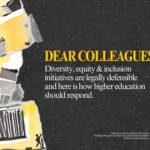
2025 ARC Graduate Research Showcase
March 21, 2025
Dear Colleagues: Diversity, equity & inclusion initiatives are legally defensible and here is how higher education should respond
March 31, 2025
In 2020, an executive order was signed to prohibit diversity, equity, and inclusion trainings within the federal government. While this order was overturned, the 2021 United States legislative session launched an organized and well-funded campaign to attack diversity, equity and inclusion in the education system with hundreds of bills introduced across states to censor teaching, training and learning in K-12 and higher education.
In less than two months in their current term, the Trump administration has now intensified the coordinated political and cultural attacks with additional executive orders and obscure directives targeting academic institutions. Despite these attacks, decades of evidence demonstrate the educational and societal benefits of diversity, equity and inclusion – improving student outcomes, preparing a skilled workforce to address the diverse needs of our society, and advancing research and innovations that offer solutions to our most pressing health, economic, and environmental challenges.
The ongoing attacks on education signal the important role that the sector plays in our society. At a fundamental level, education socializes citizens around sociocultural values, norms, and expectations, and teaches them to think critically and analytically about complex issues. The attacks on academic institutions, and higher education in particular, undermine academic freedom and the autonomy for educators to determine curricula and for researchers to freely and openly pursue scientific inquiry. Restricting and censoring higher education institutions’ efforts to advance diversity, equity and inclusion threatens societal progress made to rectify the longstanding history of systemic and structural inequalities in the United States.
In this context, staff, faculty and administrative leaders in higher education face socio-political pressures as they try to interpret and navigate incoherent policies that affect the core functions of the university including, staffing, research, student support, and campus climate, while anticipating what might come next. Attendees throughout this series will gain a deeper understanding of the University of Michigan’s historical and current higher education efforts in advancing diversity, equity and inclusion; acquire the tools to interpret the current attacks; and build the skills and courage to collectively resist and reaffirm our commitment to diversity, equity and inclusion in higher education.




